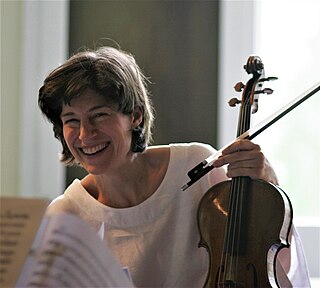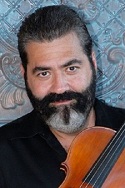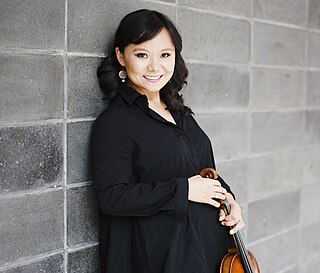Related Research Articles

The viola ( vee-OH-lə, Italian: [ˈvjɔːla, viˈɔːla]) is a string instrument that is bowed, plucked, or played with varying techniques. Slightly larger than a violin, it has a lower and deeper sound. Since the 18th century, it has been the middle or alto voice of the violin family, between the violin (which is tuned a perfect fifth above) and the cello (which is tuned an octave below). The strings from low to high are typically tuned to C3, G3, D4, and A4.

A viola concerto is a concerto contrasting a viola with another body of musical instruments such as an orchestra or chamber music ensemble. Early examples of violas taking solo roles in orchestral settings include Johann Sebastian Bach's Brandenburg Concerto No. 6, scored for two solo violas, Georg Philipp Telemann's Concerto in G major, and Carl Stamitz's Viola Concerto in D major. Arguably, one of the first concertante works to use the viola without caution was Wolfgang Amadeus Mozart's Sinfonia Concertante, scored for solo violin and viola. Although not much work was written for the viola alone in the Classical or Romantic periods, with only a few example concerto-like pieces emerging such as Max Bruch's Romanze, Hector Berlioz's Harold en Italie, or Johann Nepomuk Hummel's Potpourri, the viola concerto would see significant growth from the late 1800s.

Kim Kashkashian is an American violist. She has spent her career in the U.S. and Europe and collaborated with many major contemporary composers. In 2013 she won a Grammy Award for Best Classical Instrumental Solo. She is recognized as one of the world's top violists.

Yuri Abramovich Bashmet is a Russian conductor, violinist, and violist.
The Shanghai Quartet is a string quartet that formed in 1983. The quartet is made up of: first violinist Weigang Li, second violinist Angelo Xiang Yu, violist Honggang Li, and cellist Nicholas Tzavaras. On November 20, 2020 the ensemble announced the newest member, Angelo Xiang Yu. The Shanghai Quartet accepted the resignation of former second violinist Yi-Wen Jiang on March 17, 2020. The group's tours have included North America, South America, Japan, China, Australia, New Zealand, and Europe. Among their performances, the Shanghai Quartet has developed a long list of performance collaborators including Yo-Yo Ma, David Soyer, Eugenia Zukerman, Sharon Isbin, Ruth Laredo, Arnold Steinhardt, and Chanticleer.
Gilad Karni is an Israeli violist who has played in the New York Philharmonic and is currently principal viola in the Tonhalle Orchestra Zurich as well as a soloist and player in chamber ensembles. A founder member of the Huberman Quartet, with which he made his debut at Carnegie Hall, he has since appeared there with the Guarneri Quartet.
Michael Kugel is a Ukrainian viola player and composer.
Karen Dreyfus is a violist who currently teaches at the USC Thornton School of Music. Ms. Dreyfus has distinguished herself as a recipient of many prizes, including the Naumburg Viola Competition (1982), the Lionel Tertis International Viola Competition (1980), the Washington International Competition (1979), and the Hudson Valley Competition (1978). Ms. Dreyfus has concertized extensively in the United States, Canada, Europe, Asia, and South America.
Roger Chase is a British violist who currently teaches at the Chicago College of Performing Arts at Roosevelt University.
Cynthia Phelps is an American violist whose versatile career involves work as a chamber musician, solo artist, and orchestral musician. Phelps is currently the Principal Violist of the New York Philharmonic, a position to which she was appointed in 1992.
Sheila Browne is an American-Irish concert violist from Gladwyne, Pennsylvania with dual citizenship. She is a concert and recording artist and Associate Professor at the University of Delaware. For ten years she was on faculty and Associate Professor of Viola at the University of North Carolina School of the Arts. Named the William Primrose Recitalist of 2016 in conjunction with the Primrose International Viola Archive (PIVA), Ms. Browne has played solo, concerto and chamber music concerts and has played principal of orchestras on six continents, performing in major venues in Africa, the Americas, Asia, Europe, Australia, and the Middle East. She is in the Fire Pink Trio and principal of the New York Women's Philharmonic, making her Carnegie- Stern Hall concerto debut in 2011. Browne is the Director and faculty member of the January Karen Tuttle Viola Workshop, founder in 2015 and faculty member of the first European Karen Tuttle Viola Workshop at NYU- Prague 2016, and has served on the Executive Board of the American Viola Society Ms. Browne was the violist of the Gotham, Arianna, Pelligrini and Serafin string quartets. She has served on the faculties of Duke and New York universities, University of Missouri- St. Louis and of Tennessee- Knoxville, and Juilliard's Music Advancement Program.
Alan de Veritch is an American violist and viola teacher. He studied with William Primrose and performed in the Los Angeles Philharmonic for at least ten years. He has taught viola in various universities and was the president of the American Viola Society from 1990 to 1994.He played Jago peternella modern italian Viola
Frederick Craig Riddle OBE was a British violist. He was considered to be in the line from Lionel Tertis and William Primrose, through to the violists of today such as Lawrence Power.

Richard Fleischman is an American violist and viola d'amore player, conductor and pedagogue.

Teng Li is a Chinese-Canadian violist. She is currently the principal violist of the Los Angeles Philharmonic. From 2004 to 2018, she was the principal violist of the Toronto Symphony Orchestra. She is also the Artistic Director of Morningside Music Bridge and is a member of the Rosamunde String Quartet, led by Noah Bendix-Balgley.
Bernard Shore was an English viola player and author.
Paul Cropper, MBE, (1913-2006) was a British violist and principal viola of the BBC Northern Symphony Orchestra from 1947 to 1982.
James Lockyer was a British violist. He was the former principal violist of the Queen’s Hall Orchestra and the Beecham Orchestra. He also played with the London Symphony Orchestra and the British Chamber Music Players, and was the violist in many string quartets and ensembles in the first half of the twentieth century.
Harry Danks, (1912-2001) was a British violist and principal viola of the BBC Symphony Orchestra from 1946 to 1978. He was the founder and director of the London Consort of Viols.
Timothy Ridout is a British violist and 1st Prizewinner of the prestigious Lionel Tertis International Viola Competition.
References
- ↑ Front Matter. Musical Times No 1641, November 1979, p 888
- ↑ Gordon Jacob: Complete Music for Viola and Orchestra, reviewed by MusicWeb International
- ↑ Libbey, Theodore; (U.S.), NPR (March 13, 2006). The NPR listener's encyclopedia of classical music. Workman Publishing. pp. 925–. ISBN 978-0-7611-2072-8.
- ↑ "Paul Neubauer". Chamber Music International. Retrieved January 15, 2019.